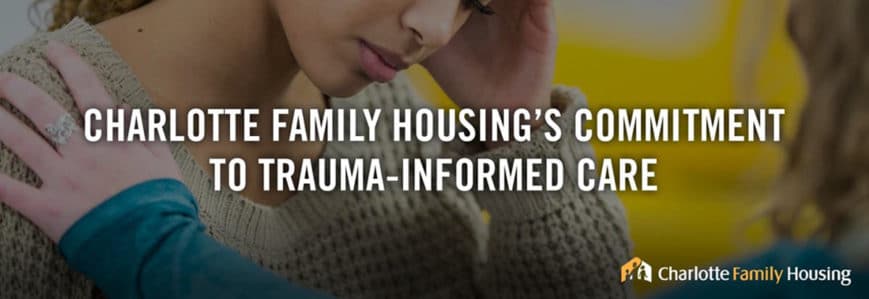Charlotte Family Housing (CFH) began the process to implement a trauma-informed care (TIC) model late 2013/early 2014. Since then, Charlotte Family Housing has made a number of changes to create a more trauma-informed environment.
To promote a trauma-informed organization, CFH pursues activities that fall under the following categories: early screening and comprehensive assessment of trauma; consumer-driven care and services; trauma-informed, educated, and responsive workforce; provision of trauma- informed, evidence-based, and emerging best practices; creating a safe and secure environment; engaging in community outreach and partnership building; and ongoing performance improvement and evaluation. While we are limited in how we pursue each activity, due to budget constraints, we have been able to find a number of low-cost or free ways to continuously pursue TIC activities.
Structured Approach:
Trauma-informed care committee – CFH has a committee that meets monthly to address priorities identified through the bi-annual TIC assessments that staff and families are asked to complete. Members of the committee include staff from every department. These priorities have ranged from making spaces safer for staff and clients to providing more education regarding trauma.
Monthly Trainings – This is one area where budget constraints have limited the types of trainings we are able to pursue. However, CFH has been able to find several free or low cost trainings to fill the gap. Staff members are required to complete a monthly training focused on
various aspects of trauma. Every other month, the training is either in-person or online. Examples of trainings include confidentiality, secondary trauma, and de-escalation strategies. In addition, all new staff members are expected to complete all past online trainings.
TIC staff assessments and TIC family assessments – Every two years, a TIC staff assessment and a TIC family assessment are sent out to identify strengths and room for improvement.
A few examples of changes that have been made:
Motivational Achievement Points Program: CFH changed their accountability system from one focused on punishing families to one focused on rewarding families for behaviors. This new system allows clients the opportunity to receive points for behaviors that support self- sufficiency. These points can be cashed in for various prizes. This has been a much better system, but one where budget constraints have created some limitations.
Simplified application and added screeners to post-entry: To minimize what may be a traumatizing experience for families, the program applications have been simplified to include only questions that are essential for determining program eligibility. After families are approved for the program, additional assessments were added to screen for trauma and other mental health conditions.
Family education: CFH has taken a few steps to address this. First, participant rights are posted throughout CFH public spaces. Second, TIC facts/updates are included in family newsletters. Third, CFH is currently working on getting trauma-focused posters made to post in public spaces. Lastly, we are developing a trauma group focused on providing psychoeducation for families.
People-first language: As an agency, we focus on using people first language (e.g. a family experiencing homelessness vs. a homeless family). Many of our documents and marketing materials have been updated to use people first language.
Family participation in decision-making: Families have opportunities to participate in decision- making by volunteering to participate on the family advisory board or the Charlotte Family Housing board. CFH also added locked comment boxes throughout CFH spaces for clients to provide anonymous feedback. In addition, client feedback surveys were added at each phase of the program, so families have the opportunity to provide on-going feedback.
Peer Support: A handful of families have expressed interest in some type of peer support system. Attempts have been made to implement something, but it has been difficult to get buy- in even from clients who have expressed strong interest. In an effort to still provide the opportunity for peer support to take place, a private Facebook group was created for former and current families. Only one staff member has access to the group. The hope is for one of the CFH families to take over the group. At that point, the staff member will hand over the group.
Creating partnerships: CFH has various partnerships within the community to address basic needs and cover gaps in services. A new partnership with A Child’s Place was created to address the social emotional needs of all children in the program.
Safety: CFH rents space and owns space. We have been able to make a few changes in the spaces we rent such as adding sound machines and making spaces more trauma-friendly; however, the extent to which we can make these changes has been limited. In the spaces that CFH owns, numerous changes have been made to physical spaces to increase feelings of safety. This has included the changes that have been made to our rented spaces, such as adding lighting and cameras to areas that were of greatest concern to staff and clients.

